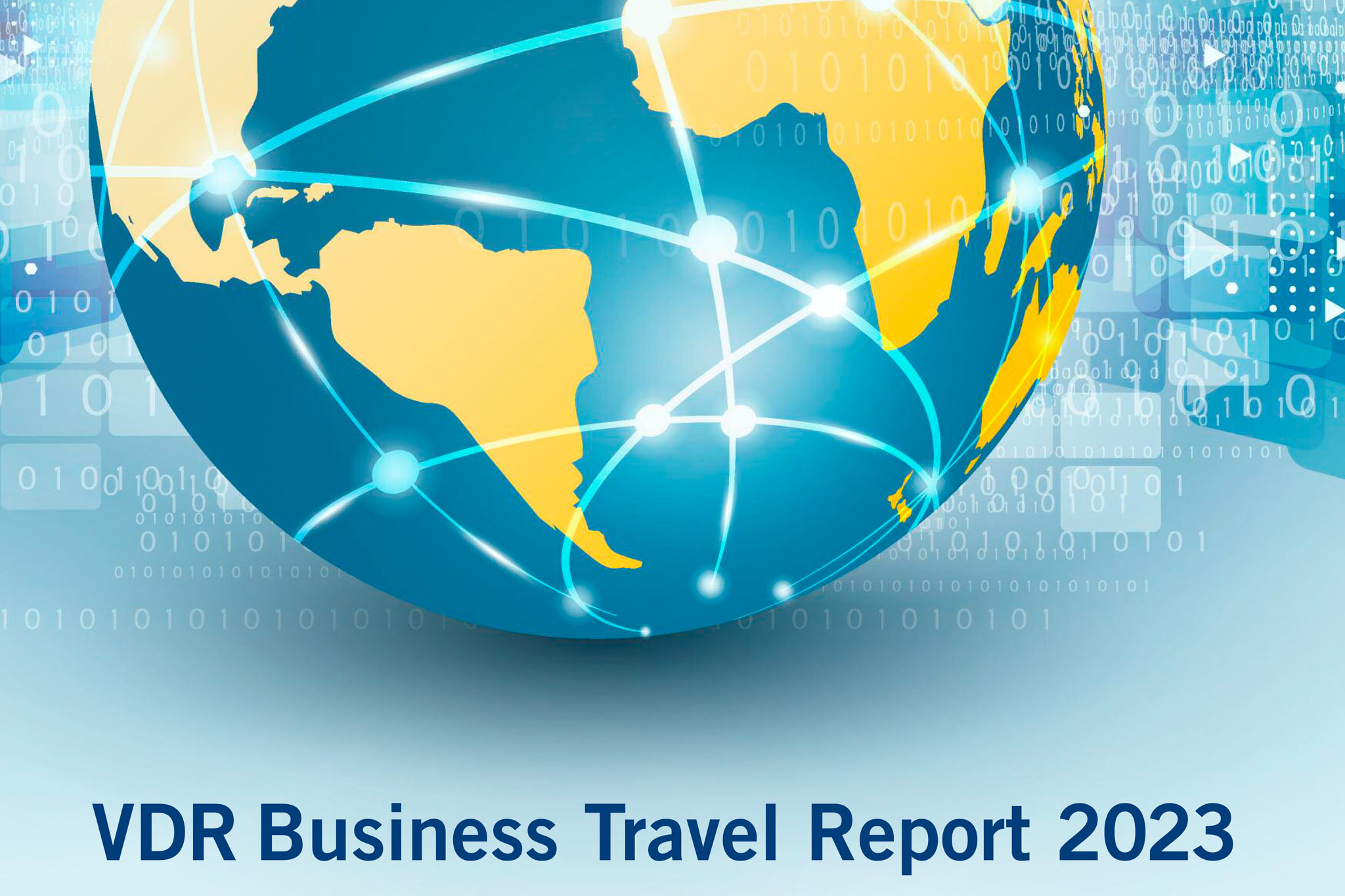Less is more. The VDR Business Travel Report 2023 confirms the rising trend towards bundling business trips.
The German Business Travel Association e.V. (VDR) has published the latest facts and figures about the German business travel sector. The VDR Business Travel Report 2023 reflects the travel behaviour of German companies and public sector organisations in 2022/2023. The report shows that these days, less is more. In the business travel sector, people travel less frequently but for longer stays of several days. Day trips abroad, as well as within Germany, are no longer in keeping with the times of climate-conscious travel. The average duration of the business trip is now two to three days in all companies. The data show a significant increase in the volume of business travel. However, VDR Vice President Inge Pirner points out that it remains to be seen how political tension and current price developments will affect the industry in the long term.
The number of business travellers continues to increase
After the effects of the pandemic brought the travel industry to a virtual standstill in 2020, there was already a resurgence in business travel in 2021. This upward trend continued in 2022. On the one hand, this was due to catch-up effects due to Covid-19 lockdowns and other restrictions. On the other hand, it becomes clear that business travel continues to be necessary for the German economy. Business trips increased by 82 per cent to 75.1 million in 2022, and expenditure doubled to €26.9 billion compared to 2021. The fact that in-person meetings are on the rise again in business life was also reflected in the number of business travellers, with 8.4 million on the road last year. That is three million more people than in the previous year. Larger companies, in particular, returned to sending more employees on business trips, with the number of travellers more than doubling last year.
Growth, but with a sense of proportion
Even if the current figures are still far from the pre-crisis level, with its peak of 13 million business travellers in 2019, the trend towards a shift in expectations placed on business travel is evident: Growth is still the aim but with a sense of proportion. Even though companies did not agree to the same extent as in the previous two years regarding a long-term reduction in business travel volume, the fundamental forecast remains that business trips will stay lower than in the record years. According to the report, over half of respondents expect this to happen because the energy crisis, inflation, and climate-friendly planning and action have replaced lockdowns, travel bans and supply bottlenecks.
Bundling of business trips
A trend from the last Business Travel Report continues to emerge. Companies increasingly opt for longer business stays to reduce travel costs, especially transport costs. The average duration of business trips across all company sizes amounted to 2.4 days. The longest business trips were taken at companies with over 1,500 employees, with a quarter lasting four days or even more, up from one-fifth in the previous year. Across all company size categories in 2022, just 45 per cent of trips did not include an overnight stay. By comparison, the share of day trips among small and medium-sized enterprises peaked at 70 per cent in 2019. In the case of longer travel durations, there is a clear upswing in overnight stays on trips abroad – these have more than doubled compared to the previous year, and domestic hosts also reported almost double the number of business overnight stays.
Shifts in business travel destinations
However, it is not only travel behaviour that is changing, but also the destinations of business travellers. For example, the importance of the neighbouring countries of Switzerland and Austria has increased significantly among the companies and organisations surveyed that engage in business travel abroad. The destinations were last surveyed in 2015. A comparison shows a clear shift in destination countries, with the USA and China losing their leading position in the business travel ranking. China’s shutdown during the pandemic and severe restrictions on entering the US left their mark. And the UK, too, since its exit from the EU, has seen a decline in business travel, in particular from more giant German corporations. India has moved up in importance as a destination. Russia, on the other hand, has disappeared from these statistics since the war began.
Climate protection and travel
Within the framework of the EU-wide “Corporate Sustainability Reporting Directive,” which has been in force since this year, more companies will be required to report more precisely than before on the sustainability of their actions and business activities going forward. However, this rule will not apply until the 2024 financial year. This may explain why sustainability reporting is still “not planned” by 29 per cent of companies with more than 500 employees. By contrast, SMEs are now carrying out sustainability reporting in mobility much more frequently than just one year ago, with the percentage rising from 31 per cent to 42 per cent.
The number of companies actively working towards sustainability in the business travel sector has increased again. Today, the first step is to assess whether a business trip is necessary. Therefore, reducing travel has become the preferred climate-friendly or planned measure for almost all companies (90 per cent). The switch from air to rail travel, partly forced in the first pandemic year 2020, remains the second most popular sustainability measure at 83 per cent.
Incentivising sustainable business travel
Sustainable offerings for employees are still on the rise. This includes, for example, cycle-to-work arrangements or commuter tickets. In the meantime, more than 80 per cent of companies use or plan to use climate-friendly offerings. However, there is a gap between what companies want to happen and travellers’ actions. The larger the organisation, the more likely employees will expect their company to take the initiative and lay down rules.¹ But if it is up to the travellers, incentivisation can direct them towards making more sustainable decisions. “As our results show, there are ways to motivate travellers to act more sustainably, such as vouchers for organic shops, sports and free-time activities or discounts on booking city bikes or e-scooters. There is almost no limit to creativity in this area, and good ideas are essential. Innovative and targeted concepts need to be created to harmonise necessary business travel further and achieve the climate goals in the future”, says Inge Pirner of the latest data coming from the business travel sector.
The current edition of the VDR Business Travel Report can be downloaded free of charge.
1 See page 68 in the report (in German).
About the VDR Business Travel Report
As in previous years, the statistical universe for the study is constituted of all businesses that have their headquarters in Germany, including those that have operations abroad, and organisations in the public sector with ten or more employees. Between January and April 2023, 800 computer-assisted telephone and online interviews were conducted with persons responsible for managing business travel or authorised by their organisations to provide the relevant data. The responses to qualitative questions reflect the situation during the survey, while all others are based on the 2022 figures. The Business Travel Report 2023 is published with the support of AirPlus International, American Express, BWH Hotels Central Europe, FCM Travel, Lufthansa Group and Uber for Business.



